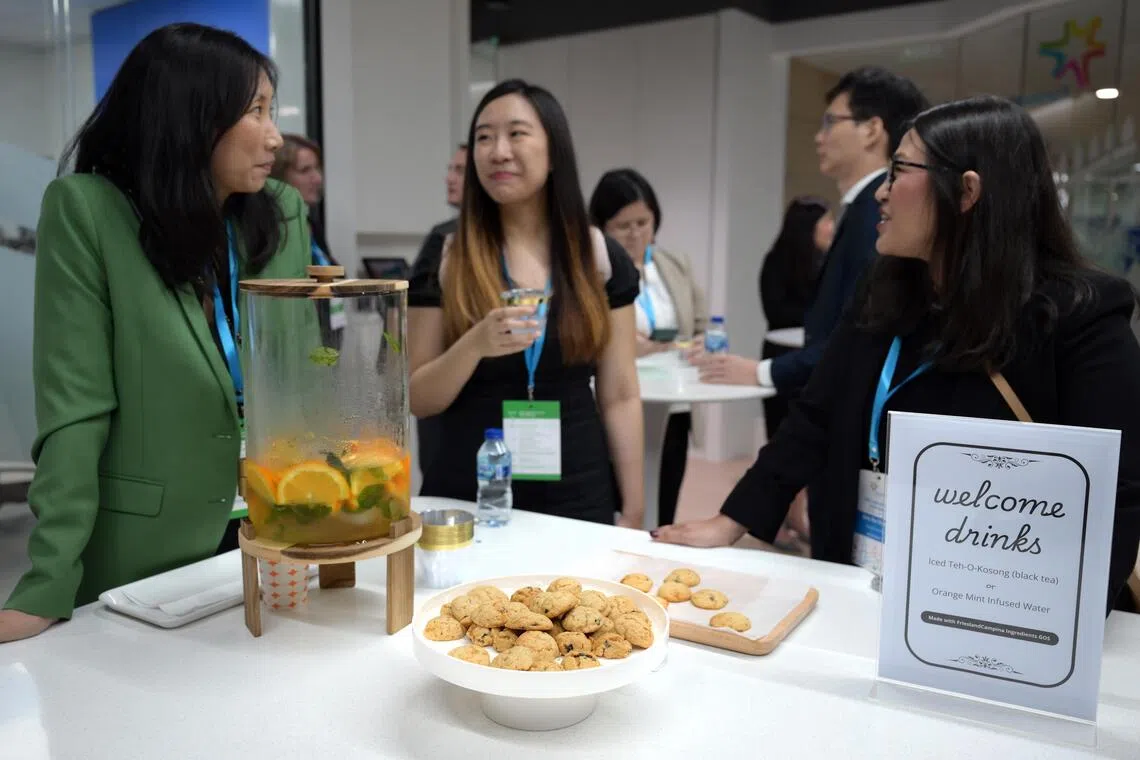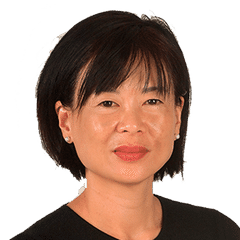Singapore boosts food innovation hub status with FrieslandCampina’s new lab
Sign up now: Get ST's newsletters delivered to your inbox

The new lab adds five new positions to FrieslandCampina’s existing 110-strong team here.
ST PHOTO: NG SOR LUAN
- FrieslandCampina opened its largest APAC Application Centre in Singapore, a food innovation lab for Asian nutritional products.
- Supported by the EDB, the lab adds five jobs, enhancing Singapore's role as a regional nutrition hub, working with universities.
- The lab has advanced food tech like UHT processing with plans for commercialisation within two years, serving Asia-Pacific clients.
AI generated
SINGAPORE – At the opening party, guests are served prebiotic-fortified teh-o and chocolate chip cookies, and shown displays of rose-coloured protein water and protein-fortified milk.
It is, after all, the launch of a new laboratory designed to bring confectioners and food manufacturers to Singapore to test, develop and launch cutting-edge nutritional products suited for Asian palates.
The Apac Application Centre is the largest of five such laboratories worldwide owned by Dutch dairy cooperative FrieslandCampina, known here for its Dutch Lady milk that has been sold in Singapore for six decades.
The new laboratory adds five new positions to the group’s existing 110-strong team here, and 30 per cent more to its current research and development floor area at its premises in Science Park Drive near the National University of Singapore.
The group officially launched the centre on Sept 15 with guests from major food producers such as Nestle, Morinaga, Reckitt, and Abbott, as well as officers from the Economic Development Board (EDB), which is supporting the centre with industry connections and grant applications.
The EDB said FrieslandCampina’s latest investment bolsters Singapore’s goal to be a regional hub for nutritional food innovation and ecosystem that already includes names such as Mondelez, Danone and Nestle.
The Government commits about 1 per cent of national output to its research and development investments. In 2024, it topped up its $25 billion Research Innovation and Enterprise budget
FrieslandCampina’s new lab is filled with specialised equipment for developing functional foods like yogurt, bars and supplements, and brings together expertise in ultra-high temperature (UHT) processing, analytical testing, sensory science and packaging.
Its president of business group ingredients, Mr Anne Peter Lindeboom, said that without a sizeable dairy industry, Singapore is likely unable to develop such technology on its own.
The cooperative, which operates in 30 countries and employs over 19,500 people worldwide, is made up of over 9,000 dairy farms in the Netherlands, Germany and Belgium. It reported €12.9 billion (S$19.4 billion) in revenues in 2024.
Mr Lindeboom declined to state the cost of the laboratory, but said the Singapore facility is its single biggest investment. Singapore has been the organisation’s regional base and its only development centre outside the Netherlands since 2011.
He said: “If you look at the underlying technology that we have for that clear protein, that is very cutting-edge… So this is a very nice illustration of how Singapore, even if its own end market is relatively small, can still leverage its knowledge, its economic position.”
The centre will serve customers in Japan, South Korea, Australia, New Zealand and South-east Asia.

FrieslandCampina’s new lab is filled with specialised equipment for developing functional foods like yogurt, bars and supplements.
ST PHOTO: NG SOR LUAN
The group chose to base the facility in Singapore, despite its higher costs of business, for its talent pool. The organisation plans to work with local universities and schools in its development.
Ms Alicia Tan, the facility’s project manager, was given a budget and tasked to pull together vendors and colleagues to set up the centre in 2024.
The 33-year-old Singaporean, who is trained in food science and technology, said her goal now is to successfully commercialise concepts born out of the laboratory within the next two years.
She said: “When we didn’t have this area, we always went back to Amersfoort, which is our headquarters. But for clients in the Asia-Pacific to travel to our headquarters is very difficult because it takes a 12-, 13-hour flight. Some probably don’t even have the budget.
“So having this place here means we can have our experts fly in to hold a webinar or a training session. At the same time, clients can reach out to this area, like it’s a common ground.”



